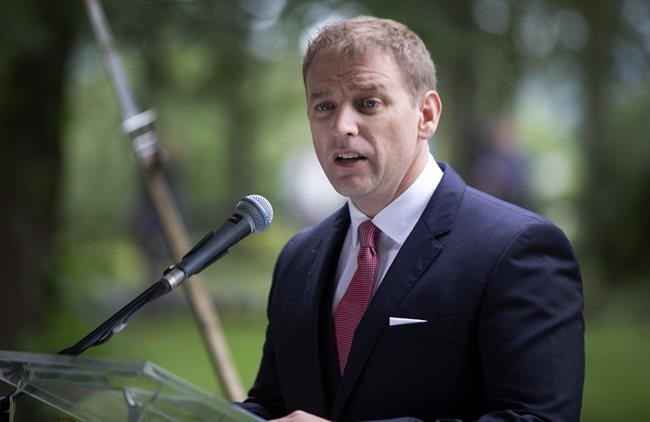ST. JOHN'S, N.L. — Newfoundland and Labrador will become the fourth province to go to the polls during the COVID-19 pandemic after Premier Andrew Furey called an election for Feb. 13.
The governing minority Liberal leader announced the election Friday evening at the provincial legislature as rafts of snow swept by the windows, blown sideways by the wind. The province hasn't had a winter election since February 1999, when Liberal Brian Tobin was re-elected.
Like Tobin, and like in Canada's three previous pandemic elections in Saskatchewan, British Columbia and New Brunswick, Furey hopes his party will be re-elected with a majority.
"This election will be about your choice on leadership," Furey told the small gathering of reporters. "Who you want to lead the province through the pandemic. Who you want to lead it through the economic challenge. Who you want to sit at the table with the federal Liberal government to strike a new deal."
The general election will be Furey's first since he was chosen Liberal leader in August to replace Dwight Ball. Under provincial law, an election had to be called within a year of him becoming premier.
During his speech, Furey said Newfoundland and Labrador's success in keeping the COVID-19 pandemic at bay is a national example. He said he chose a Saturday for the vote to give people time to get to the polls and to avoid crowding at polling stations during the pandemic.
Furey's biggest competition will come from the Opposition Progressive Conservatives, led by lawyer Ches Crosbie, son of the famously outspoken politician John Crosbie.
In a news conference held just before Furey announced the election, Crosbie said that even before the pandemic struck, the province was "teetering on the edge of financial ruin."
He said he’ll be unveiling his plan to revive the economy in the coming days. “An urgent change in government is needed before it's too late,” he said. “A Progressive Conservative government led by me will be a job-creation machine.”
In an interview Friday, the Tories' campaign chair, Shawn Skinner, said the pandemic means the party won't have a tour bus heading across the province. "You'd be a driving petri dish," he said. Instead, the campaign will rely more on livestreamed events, he added. Candidates will be knocking on doors, but they'll stand back and give people appropriate space when they answer, he said.
The provincial NDP, led by economist Alison Coffin, made gains in the last general election in May 2019, winning three seats in the legislature after running just 14 candidates in the province's 40 ridings.
Kyle Rees, the NDP's campaign chairman, said the party expects to have at least 30 candidates this time. "Ever since the last election, we've been preparing for this one, with full knowledge that the minority government situation meant that we could have an election any day," Rees said in an interview Friday.
At dissolution, the Liberals held 19 seats, the Progressive Conservatives held 15, the NDP had three and there were three Independents.
Both Skinner and Rees said the biggest issue staring down voters is the province's staggering economic trouble. With a rapidly aging population of just over 520,000, Newfoundland and Labrador faces a $1.84-billion deficit and a $16.4-billion net debt. That's the highest net debt per capita in the country, according to a report last month from RBC.
At the heart of the province’s financial fear are its four offshore oil installations, hundreds of kilometres off the coast of St. John's. Crashing global oil prices and the pandemic last spring forced shutdowns and delays resulting in hundreds of layoffs.
Thousands more have lost their jobs with offshoot companies supplying the sector, according to the province’s industry association.
The futures of both the Husky-owned White Rose field and the Suncor-owned Terra Nova field remain uncertain, with both companies saying they could decommission their fields and leave if fortunes don’t change.
Ottawa stepped in last fall with $320-million in aid for the sector, to be parcelled out by the province, but the money has been controversial. Funding offered to companies so far hasn't come with guarantees of large job numbers or, in the case of Husky, a long-term commitment to see the project through.
In September, Furey assembled an economic recovery team, chaired by Moya Greene, a St. John’s-based businesswoman known for privatizing Britain’s postal service. Her appointment, coupled with the province’s towering financial challenges, has many worried the team will recommend austerity measures and sweeping privatization.
A first draft of the team's proposed plan is due in February, and both of the main opposition parties have said it is irresponsible for Furey to send people to the polls without knowing what they’ll be in for if the Liberals are re-elected.
In his speech Friday evening, Furey acknowledged the uncertainty was frightening, but he said it ultimately presents an opportunity for Newfoundland and Labrador to right its course and move forward.
This report by The Canadian Press was first published Jan. 15, 2021.
Sarah Smellie, The Canadian Press



